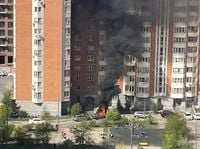In a shocking turn of events, General-Major Yaroslav Moskalik, the Deputy Head of the Main Operational Directorate of the General Staff of the Armed Forces of the Russian Federation, was killed in a car explosion on April 25, 2025, in Balashikha, a city located in the Moscow region. The incident has sent ripples through the military and the public, raising questions about the safety and security of high-ranking officials in Russia.
According to reports from Russian media, the explosion occurred when a Volkswagen Golf was detonated using a homemade explosive device. This device was strategically placed inside the vehicle, near gas cylinders, and was activated remotely as Moskalik exited his residence. The Investigative Committee of the Russian Federation has confirmed the explosion and is currently investigating the circumstances surrounding the incident.
"The explosion occurred as a result of the detonation of a homemade explosive device, stuffed with damaging elements," stated Svetlana Petrenko, an official spokesperson for the Investigative Committee. The committee has opened a criminal case under Article 105 (murder) and Article 222.1 (illegal trafficking of explosives) of the Russian Criminal Code.
Following the explosion, investigators, criminalists, and experts from the Investigative Committee, along with operational units from law enforcement agencies, rushed to the scene to gather evidence and establish a timeline of the events. The authorities are treating the incident with the utmost seriousness, given the high-profile nature of the victim.
Yaroslav Moskalik, aged 59, was not only a significant figure within the Russian military but also had a history of involvement in crucial negotiations, including those with Ukraine as part of the Normandy format in 2015. He had also served as a spokesperson on issues related to Russia's military operations in Syria, making his role in the armed forces particularly notable.
The explosion has raised alarms, especially in light of recent events within the Russian military. Just months prior, on December 17, 2024, General Lieutenant Igor Kirillov, the head of the radiation, chemical, and biological defense forces of the Russian Armed Forces, was also killed, an event that has been linked to the ongoing tensions and conflicts involving Russia.
As investigations continue, many are left wondering about the implications of this attack on the security of military officials in Russia. The use of a homemade explosive device suggests a level of planning and intent that could point to deeper issues within the security apparatus.
Reports have indicated that there were potentially two victims in this incident: the driver and a passenger who exited the vehicle at the time of the explosion. This adds a layer of complexity to the investigation, as the authorities seek to understand the full scope of the event.
Interestingly, further investigations revealed that the Volkswagen Golf had a history of ownership. The vehicle was sold to a visitor from Azerbaijan back in January, raising questions about the motivations behind the attack and the identity of the individuals involved.
As of now, the Russian Investigative Committee has not disclosed any suspects or motives behind the assassination of General Moskalik. However, the method of the attack—using a remote detonation device—indicates a level of sophistication that may suggest involvement from organized groups or individuals with specific grievances against the military establishment.
The military community and the public are left grappling with the implications of this incident, as it not only highlights the dangers faced by those in high-ranking positions but also raises concerns about the stability and security of the Russian military apparatus as a whole.
In the wake of this tragedy, calls for increased security measures for military officials are likely to grow louder. The Russian government may need to reevaluate its protocols for protecting key figures, especially in light of the recent wave of violence targeting military personnel.
As the investigation unfolds, it will be crucial to monitor how the Russian authorities respond to this attack and what measures they will implement to prevent future incidents. The assassination of a high-ranking official like Moskalik could have far-reaching consequences, not only for the military but also for the political landscape in Russia.
While the motives behind the explosion remain unclear, the ramifications of this event will undoubtedly resonate throughout the military and government sectors. The loss of General Moskalik is a stark reminder of the precarious nature of security in a time of heightened tensions and conflict.
In conclusion, the assassination of General-Major Yaroslav Moskalik marks a significant moment in the ongoing narrative of violence and instability within the Russian military. As the nation grapples with this shocking event, the focus will inevitably turn to the broader implications for national security and the safety of its military leaders.




